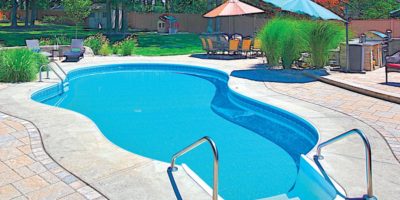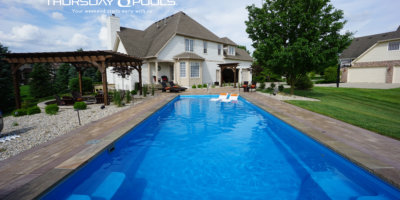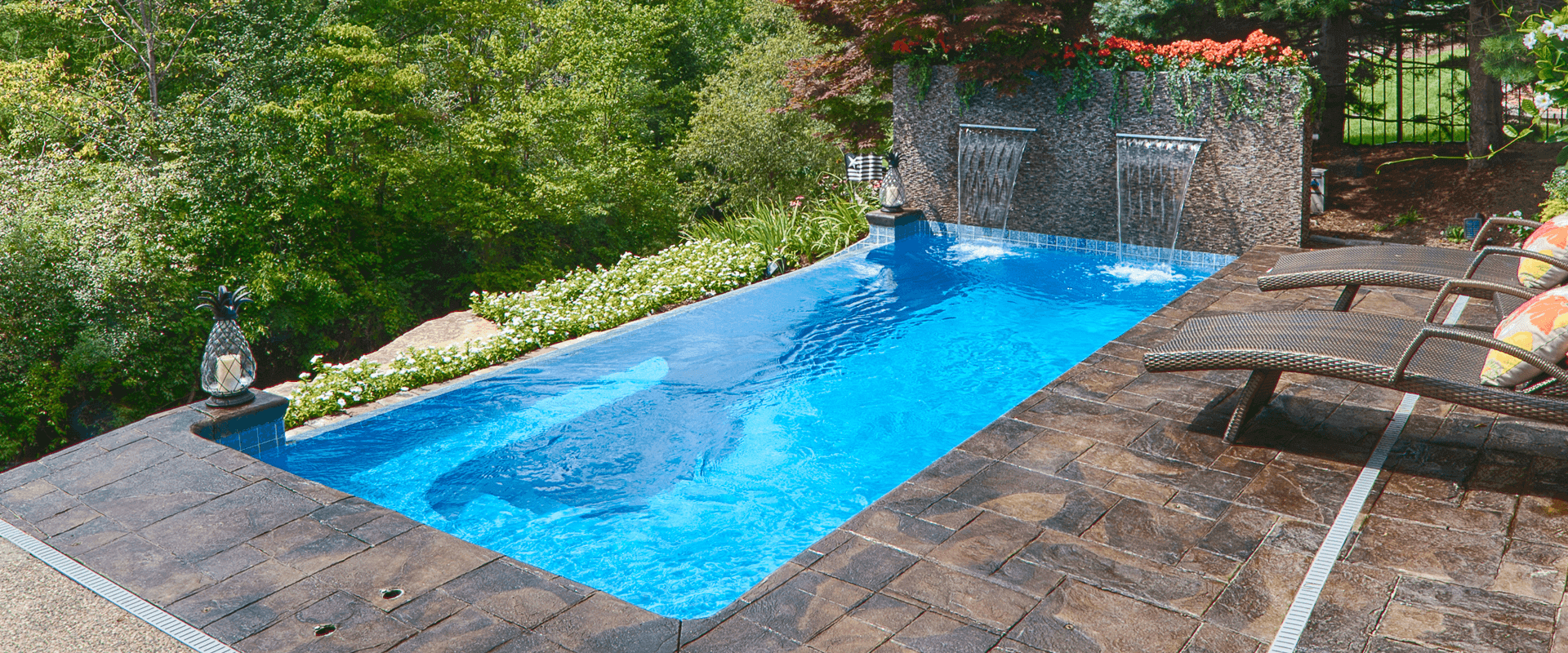877-929-7665
What Type of Pool is Easiest to Maintain?
What type of inground pool is the easiest to maintain? Is it concrete (gunite)? Or vinyl? Maybe it’s fiberglass? It’s an important question for the prospective pool owner. Maintenance is part of the budget and the pool lifestyle. The pool maintenance conversation is interesting in that the pool types that require the most maintenance require the most explanation. That’s not meant to scare you away from something you have your eye on, but to let you know what to expect when it comes to the time and financial resources you will pour into your pool once it is purchased.
The variety of pool types exists for a reason. Each leverages different materials and technology toward specific purposes. Fiberglass is unique and manufactured in a controlled setting and then shipped as a unit to its site. Concrete can be very custom, is built on site, and can be quite expensive. Vinyl is also built on site, but it is relatively inexpensive to install. Let’s review the pluses and minuses of each pool type and then talk about where maintenance fits into the purchase decision for different buyers.
For this conversation, we’ll assume you are an inground pool buyer. Above-ground pools are part of the pool market, of course, and they are incredibly inexpensive by comparison, but they typically do not last as long. In addition, the experience they offer is very different from an inground swimming pool. We’ll discuss concrete, vinyl-lined, and fiberglass inground pools, and we’ll order that discussion from most maintenance to least maintenance.
Concrete (Gunite) Pool Pros and Cons
 Concrete pools allow for customization and creativity. They offer the most flexibility of all pools, allowing the buyer to choose the look, feel, shape, depth, size, and features. The concrete pool surface is typically rough, and as a result, can snag swimsuits and scrape kids’ feet and dogs’ paws. The cost can be higher, ranging from $50,000 to $120,000 and up. Concrete pool costs vary broadly based on customizations and region of the country.
Concrete pools allow for customization and creativity. They offer the most flexibility of all pools, allowing the buyer to choose the look, feel, shape, depth, size, and features. The concrete pool surface is typically rough, and as a result, can snag swimsuits and scrape kids’ feet and dogs’ paws. The cost can be higher, ranging from $50,000 to $120,000 and up. Concrete pool costs vary broadly based on customizations and region of the country.
Concrete pool maintenance is the most involved of the three types of inground pools. The surface’s porosity welcomes algae, and algae is tough to get at. It typically requires a weekly scraping with a steel brush to get in those nooks and crannies. To stem the algae problem, you’ll probably need a professional cleaning every three to five years for around $500. To protect the surface, you’ll also need to resurface it every 12 to 15 years for approximately $7,000 per 1,000 square feet.
Water chemistry is essential for all pools. It takes extra vigilance to ward off algae and salt, calcium and other minerals with concrete. This care generally requires filtering twice a day, therefore paying a little more in annual electrical costs. Most concrete pool owners will need or choose to hire a professional to open, close, or do a thorough cleaning each year, as well.
The average concrete pool owner can expect to perform around 4-8 hours of maintenance per week.
Vinyl Pool Pros and Cons
Vinyl pools also allow for a certain amount of creativity. Vinyl-lined pools can feature ledges, sitting benches, and the like. But the surface is slippery and not as conducive to these features as other types of pools. The soft vinyl surface is prone to ripping and punctures by everything from dog claws to sharp objects dropped in the pool to fallen tree limbs. Vinyl pools are relatively quick to install and, at around $25,000 to $65,000 on average, these pools are the least expensive of the three in upfront costs.
Vinyl-lined pool maintenance is not as extensive as concrete, and you certainly won’t be using a steel brush on its more delicate surface. Your level of care will depend in part on how much you use it and how proactive you are with regular maintenance. Its propensity to rip can result in the need for patching and or liner replacements. Liner replacements can be a $3,000 to $7,500 investment every five to seven years. If water chemistry isn’t carefully maintained, the liner may need to be replaced more often. The seams of a vinyl pool can also collect algae, keeping your regular chemistry costs about double to fiberglass. With a vinyl pool, you can save a little money by filtering one time per day and using fewer chemicals than you would with concrete, and you may not need to hire a professional as often as you might with a concrete pool.
steel brush on its more delicate surface. Your level of care will depend in part on how much you use it and how proactive you are with regular maintenance. Its propensity to rip can result in the need for patching and or liner replacements. Liner replacements can be a $3,000 to $7,500 investment every five to seven years. If water chemistry isn’t carefully maintained, the liner may need to be replaced more often. The seams of a vinyl pool can also collect algae, keeping your regular chemistry costs about double to fiberglass. With a vinyl pool, you can save a little money by filtering one time per day and using fewer chemicals than you would with concrete, and you may not need to hire a professional as often as you might with a concrete pool.
The average vinyl-lined pool owner can expect to perform around 4-6 hours of maintenance per week.
Fiberglass Pool Pros and Cons
 Fiberglass today provides the best of both worlds. Like a vinyl pool, it is quick to install—quicker in that it comes as an entirely manufactured shell ready to be dropped into an excavated backyard spot. While not as customizable as concrete pools, the breadth and creativity of the modern fiberglass pool far surpass the expectations of many first-time pool shoppers. The upfront cost of a fiberglass pool is usually a little more than vinyl and a little less than a comparable concrete pool, ranging from $45,000 to $85,000 on average.
Fiberglass today provides the best of both worlds. Like a vinyl pool, it is quick to install—quicker in that it comes as an entirely manufactured shell ready to be dropped into an excavated backyard spot. While not as customizable as concrete pools, the breadth and creativity of the modern fiberglass pool far surpass the expectations of many first-time pool shoppers. The upfront cost of a fiberglass pool is usually a little more than vinyl and a little less than a comparable concrete pool, ranging from $45,000 to $85,000 on average.
Fiberglass pools are the most durable of the three. The attractive gel coat that seals the surface of the thick, multilayered fiberglass material resists fading and damage. There are no seams and pores to collect algae, so that alone saves on chemicals and quite a bit of time scrubbing.
Fiberglass pools require fewer chemicals and less filter circulation, even with cutting-edge features like tanning ledges. If a concrete pool can cost close to $700 annually for chemicals and around $600 for electricity related to the filtering, a fiberglass pool should run about a third of that cost. And, you do not need to acid wash the surface every three years as you would with concrete.
The average fiberglass pool owner can expect to perform around 1-2 hours of maintenance per week.
Long story short, the type of inground pool that is the easiest to maintain is clearly fiberglass. If you want an even more in-depth comparison of vinyl vs concrete vs fiberglass pools, check out our comparisons of inground pools.
